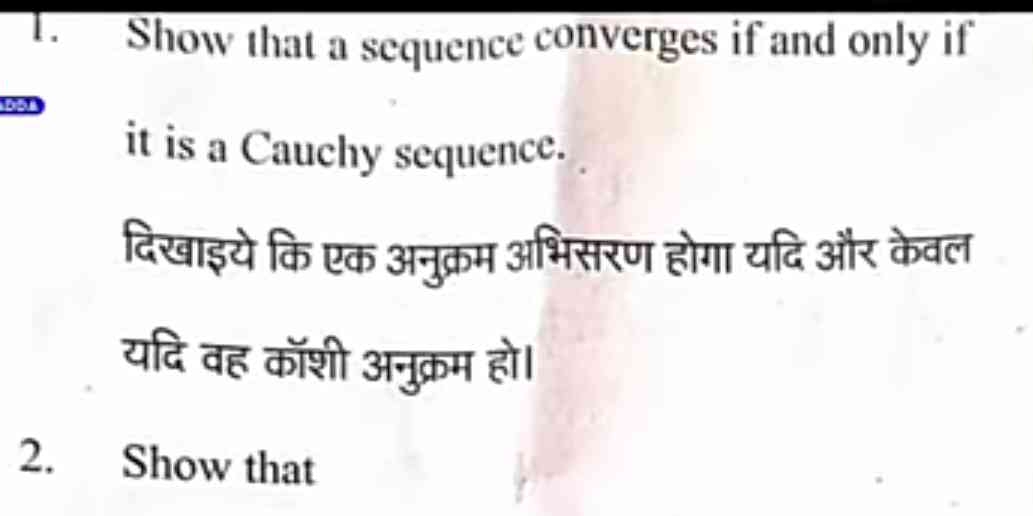Show that a sequence converges if and only if it is a Cauchy sequence.

Understand the Problem
The question is asking to demonstrate that a sequence converges if and only if it is a Cauchy sequence. This involves providing a proof related to the definitions of convergence and Cauchy sequences in mathematical analysis.
Answer
A sequence converges if and only if it is a Cauchy sequence.
Answer for screen readers
A sequence converges if and only if it is a Cauchy sequence.
Steps to Solve
- Understanding Convergence and Cauchy Sequences
A sequence ${a_n}$ converges to a limit $L$ if for every $\epsilon > 0$, there exists a natural number $N$ such that for all $n \geq N$, $|a_n - L| < \epsilon$.
A sequence ${a_n}$ is a Cauchy sequence if for every $\epsilon > 0$, there exists a natural number $N$ such that for all $m, n \geq N$, $|a_m - a_n| < \epsilon$.
- Proving that Convergence Implies Cauchy
Assume ${a_n}$ converges to $L$.
Then for any $\epsilon > 0$, there is an $N_1$ such that $|a_n - L| < \frac{\epsilon}{2}$ for all $n \geq N_1$.
For any $m, n \geq N_1$, we have:
$$ |a_m - a_n| \leq |a_m - L| + |L - a_n| < \frac{\epsilon}{2} + \frac{\epsilon}{2} = \epsilon $$
Thus, ${a_n}$ is Cauchy.
- Proving that Cauchy Implications Convergence
Now assume ${a_n}$ is a Cauchy sequence.
For every $\epsilon > 0$, there exists an $N_2$ such that $|a_m - a_n| < \epsilon$ for all $m, n \geq N_2$.
Since Cauchy sequences are bounded, we can find a limit $L$ such that the sequence converges to this limit.
- Converging to a Limit
For all $n \geq N_2$, we can extract a convergent subsequence that will converge to some limit $L$. Since the whole sequence is Cauchy, it converges to $L$.
Thus, ${a_n}$ converges.
A sequence converges if and only if it is a Cauchy sequence.
More Information
This statement is a fundamental result in real analysis, establishing a close relationship between convergence and the Cauchy property of sequences in complete metric spaces.
Tips
- Confusing convergence with being bounded; a sequence can be bounded but not converge.
- Assuming a sequence converges based solely on the behavior of a few terms without checking the definition for all $n$.
AI-generated content may contain errors. Please verify critical information